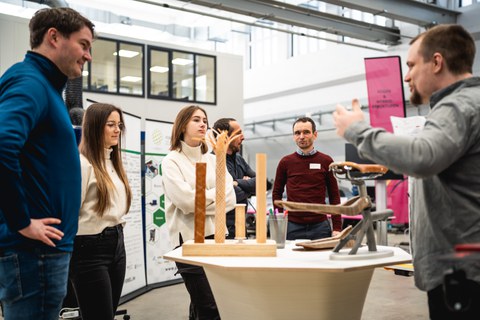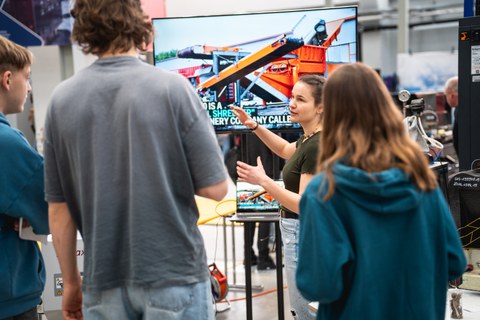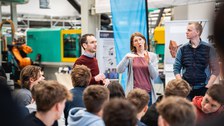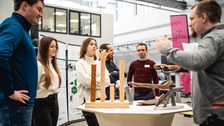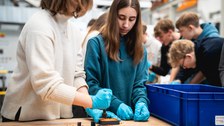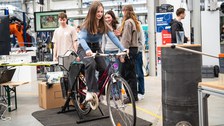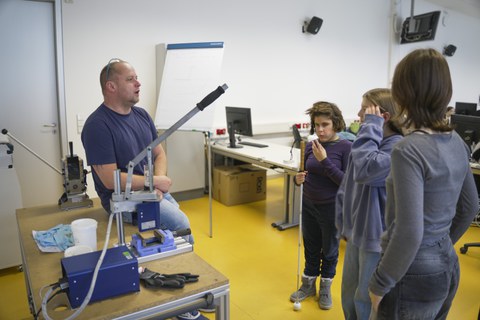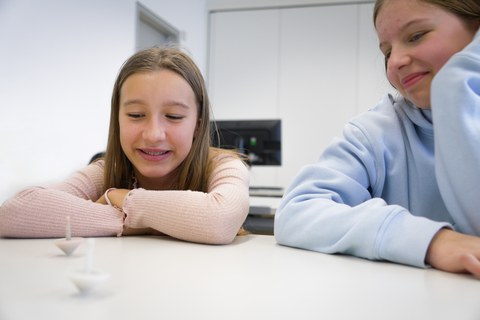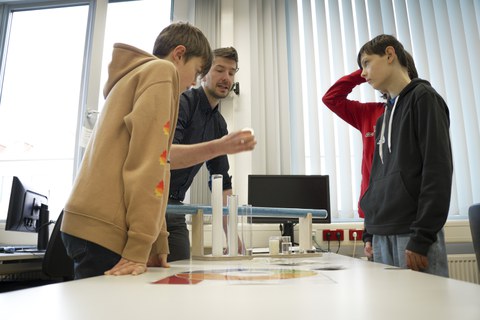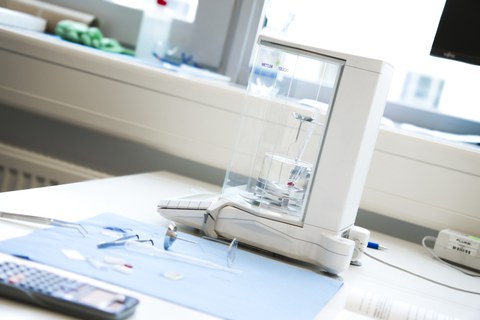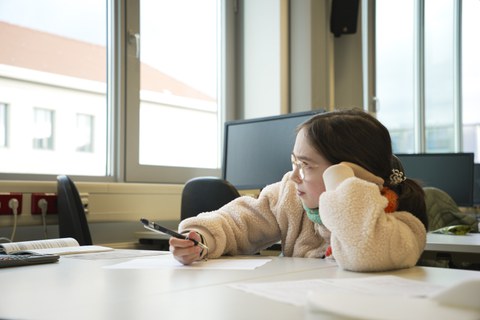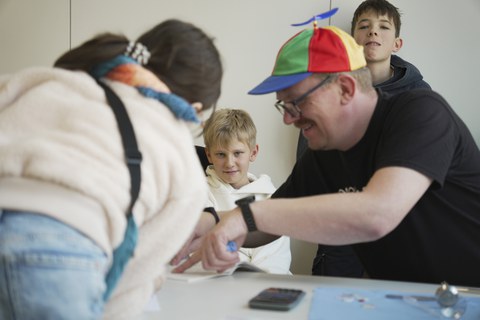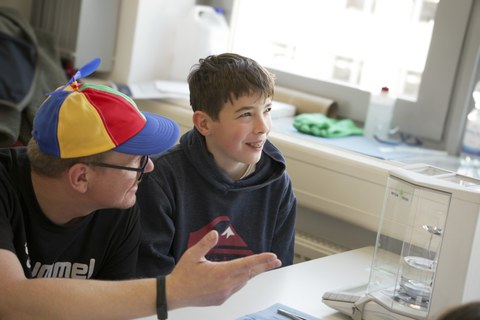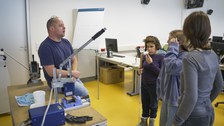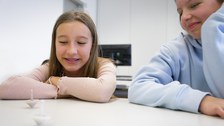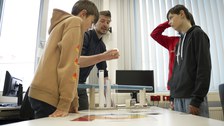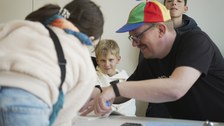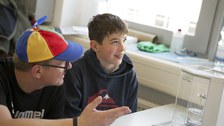Nachwuchsförderung 2024
Nachwuchsförderung ist essenziell für wissenschaftlichen Fortschritt und technologische Innovation. Durch frühzeitige Einbindung in Forschung und Praxis erhalten junge Menschen die Möglichkeit, ihr Wissen zu vertiefen, eigene Ideen zu entwickeln und wertvolle Netzwerke aufzubauen. Am ILK begleiten wir den wissenschaftlichen Nachwuchs auf diesem Weg von der Schulzeit über das Studium bis hin zur Promotion und schaffen. Hier finden Sie eine Auswahl an Projekten und Initiativen zu unseren Nachwuchsaktivitäten im Jahr 2024:
Im Februar 2024 veranstaltete das Institut für Leichtbau und Kunststofftechnik (ILK) der TU Dresden einen dreistündigen Workshop zur Kinderbetreuung, welcher sich insbesondere mit dem Thema Recycling befasste. Ziel war es, den teilnehmenden Schüler:innen nicht nur das ILK als Forschungseinrichtung näherzubringen, sondern sie auch für die Vor- und Nachteile des Recyclings sowie für den bewussten Umgang mit Materialien in Elektrogeräten zu sensibilisieren.
Der Workshop begann mit einer Einführung in die Grundlagen der Mülltrennung und des Recyclings. Welche Herausforderungen mit dem Recycling von Kunststoffen einhergehen und wie sich verschiedene Kunststoffarten unterscheiden, lernten die Schüler:innen in einem interaktiven Vortrag. Anschließend erhielten sie die Gelegenheit, Elektroschrott in seine Bestandteile zu zerlegen, das Gewicht der einzelnen Komponenten zu bestimmen und so ein besseres Verständnis für die Zusammensetzung moderner Elektrogeräte zu entwickeln. Durch die praktische Herangehensweise wurde deutlich, wie viele unterschiedliche Materialien in Alltagsgegenständen verarbeitet sind und welche Konsequenzen dies für das Recycling hat.
Ein Rundgang durch das ILK ermöglichte den Schüler:innen zudem, die Aufgaben und Forschungsfelder des Instituts und seinen Mitarbeiter:innen kennenzulernen. Abgerundet wurde der Workshop durch spielerische Elemente, bei denen die Teilnehmer:innen ihre Kenntnisse zur Mülltrennung anwenden und vertiefen konnten.
Bewusstseinsbildung für nachhaltige Werkstoffkreisläufe
Die frühzeitige Auseinandersetzung mit Recycling und Kreislaufwirtschaft kann für die Entwicklung eines nachhaltigen Bewusstseins eine entscheidende Rolle spielen. Indem junge Menschen bereits im schulischen Umfeld mit den Prinzipien der Kreislaufwirtschaft in Berührung kommen, wird ein Grundverständnis geschaffen, das langfristig zu einem verantwortungsvollen und reflektierten Umgang mit Ressourcen führen soll. Darüber hinaus wecken Initiativen wie diese nicht nur das Interesse junger Menschen an Berufen und Forschungsfeldern im Bereich der nachhaltigen Werkstofftechnik, sondern tragen auch dazu bei, bereits im Kindesalter Begeisterung für MINT-Berufe zu fördern und langfristig den Fachkräftenachwuchs in diesen Zukunftsbereichen zu sichern.
Der Übergang zu einer nachhaltigen Kreislaufwirtschaft stellt eine der zentralen Herausforderungen der modernen Industrie dar. Besonders im Leichtbau kommt der Schaffung geschlossener Materialkreisläufe sowie Entwicklung energieeffizienter Fertigungsprozesse eine Schlüsselrolle zu. Wie diese Prinzipien in die Praxis umgesetzt werden können, stand im Mittelpunkt der Veranstaltung KREISLAUF.LEICHTBAU.ERLEBEN., welche am 18. und 19.03.2024 vom Institut für Leichtbau und Kunststofftechnik (ILK) organisiert wurde. Zwei Tage lang erhielten die Teilnehmenden einen praxisnahen Einblick in die Zukunft des Leichtbaus und dessen Beitrag zu einer ressourcenschonenden Wirtschaft.
Während der zweite Veranstaltungstag ausschließlich der Wissenschaft Industrie und Politik vorbehalten war, hatten am ersten Tag der 1. Nationalen Kompetenzschau ca. 150 sächsische Schüler:innen die Möglichkeit, hautnah zu erleben, wie entscheidend der Leichtbau für eine nachhaltige Zukunft ist. Im Dresdner LEIV, dem Nationalen Leichtbau-Validierungszentrum des ILK, präsentierten Expert:innen aus Industrie und Wissenschaft in vier unterschiedlichen Technologiebereichen, inwieweit der Leichtbau zur Gestaltung einer funktionierenden Kreislaufwirtschaft beiträgt. Durch spannende Experimente und interaktive Workshops konnten die Schüler:innen theoretisches Wissen auf praktische Weise anwenden und ein tiefgehendes Verständnis für die Zusammenhänge beim nachhaltigen Wirtschaften entwickeln. Mithilfe von Live-Demonstrationen, interaktiven Workshops und Hands-On-Stationen wurde das Ineinandergreifen von Leichtbau und Kreislaufwirtschaft praxisnah vermittelt. Geführte Rundgänge durch moderne Fertigungsanlagen, Vorführungen zur Prozessoptimierung sowie Analysen von CO₂-Impact und Recyclingverfahren boten zahlreiche Einblicke in die gesamte Wertschöpfungskette.
Das Angebot richtete sich insbesondere an Schüler:innen und Auszubildende mit naturwissenschaftlichem oder technischem Fokus. Sie erhielten einen fundierten Überblick über zukunftsweisende Industriebereiche und eine Orientierung zu potenziellen Ausbildungs- und Karrierewegen im Bereich des nachhaltigen Leichtbaus. Auch die Möglichkeit direkte Kontakte zu potenziellen zukünftigen Arbeitgebern knüpfen, war auf dem Event gegeben. Die enge Zusammenarbeit mit Technologiepartnern aus Industrie und Forschung ermöglichte dabei praxisnahe Einblicke in aktuelle Entwicklungen und berufliche Perspektiven. Gleichzeitig trug das Format dazu bei, den Wissenstransfer zu beschleunigen und ein stärkeres Bewusstsein für die Herausforderungen und Chancen einer kreislauforientierten Wirtschaft zu schaffen.
Mit „KREISLAUF.LEICHTBAU.ERLEBEN“ strebte das ILK an, eine Brücke zwischen Industrie und Bildung zu schlagen. Das Event wurde sowohl von Schüler:innen als auch von Lehrkräften und Industrieexpert:innen gleichermaßen enthusiastisch aufgenommen. Darüber hinaus unterstrich die hohe Nachfrage der Schulen das Interesse der jungen Generation an beruflichen Perspektiven im Maschinenwesen und im Leichtbau. Dem ILK war es eine große Freude, auf diesem besonderen Weg die Nachwuchsförderung voranzutreiben und den Schüler:innen eine inspirierende und lehrreiche Erfahrung zu bieten.
Wir danken unseren Partnern sowie den Bundesministerien für Wirtschaft und Klimaschutz (BMWK) und für Bildung und Forschung (BMBF) für ihre unschätzbare Unterstützung. Ihr Beitrag war wesentlich für den Erfolg dieses Projekts!
Weiterführende Links
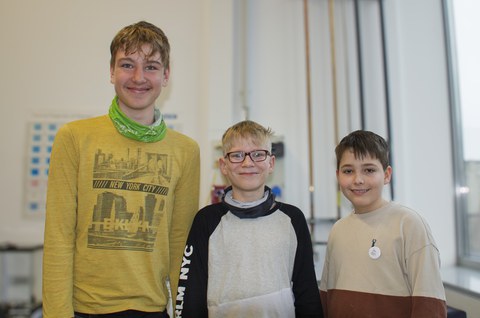
Schüler des MANOS-Gymnasiums.
Im Rahmen der Projektwoche des MANOS Gymnasiums erhalten Schüler:innen die Gelegenheit, sich am Institut für Leichtbau und Kunststofftechnik (ILK) praxisnah mit den Themen Leichtbau, Kunststoffkreislauf und innovativen Recyclingprozessen auseinanderzusetzen. Ziel ist es, den Schüler:innen ein fundiertes Verständnis dafür zu vermitteln, was Kunststoffe und Faserkunststoffverbunde sind, wie sie hergestellt sowie verarbeitet werden und welche Möglichkeiten es gibt, diese Materialien nachhaltig wiederzuverwenden. Anhand praktischer Demonstrationen und interaktiver Workshops wird gezeigt, wie ein effizienter Umgang mit Kunststoffen und deren Recycling realisiert werden kann. Ein weiterer Schwerpunkt des Projekts liegt auf den Anforderungen an Leichtbaumaterialien und -systemen im Kontext zu mobilen Wasserstoffanwendungen.
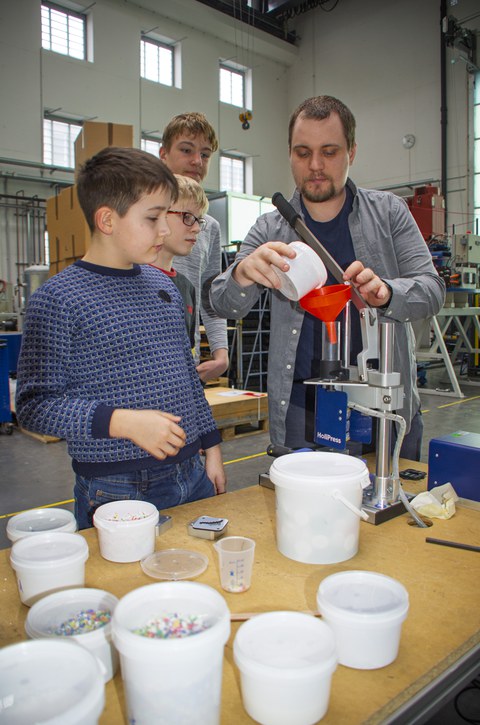
Schüler des MANOS-Gymnasiums an der HoliPress-Maschine.
Im Programm von MANOS sind folgende praxisorientierte Module enthalten:
- Kunststoffsortierung und -charakterisierung: Einsatz von NIR-Technologie zur Ermittlung von Recyclingcodes.
- Materialanalytik: Durchführung von DSC-Analysen zur Untersuchung der thermischen Eigenschaften von Kunststoffen.
- Produktionsprozesse: Herstellung von Kunststofffilamenten und Demonstration des Aufbaus eines 9R-Demonstrators inklusive Erstellung einer Gliederung für eine begleitende Präsentation.
- Fertigung von Kunststoffbauteilen: Praktische Anwendung am Beispiel des Holymaker-Systems, gefolgt von einer abschließenden Präsentation der Ergebnisse.
Die Projektwoche am ILK war ein voller Erfolg und bot den Schüler:innen eine spannende Mischung aus Theorie und Praxis mit vielen neuen Erkenntnissen, handfesten Erfahrungen und wertvollen Impulsen für die Zukunft.
Im Rahmen eines praxisnahen Wissenschaftstages begrüßte das Institut für Leichtbau und Kunststofftechnik (ILK) Schüler:innen des Campus Cordis, um ihnen einen umfassenden Einblick in die Welt der modernen Werkstofftechnik zu ermöglichen. Bei einem interaktiven Rundgang durch die Labore und Technikhallen konnten die Teilnehmer:innen an verschiedenen Stationen selbst aktiv werden und zentrale Aspekte der Kunststoffverarbeitung, Materialanalyse und Nachhaltigkeit erleben.
Ein besonderer Schwerpunkt lag auf der Bestimmung und Charakterisierung verschiedener Kunststoffe. Durch Dichtemessungen und Sortierverfahren lernten die Schüler:innen, wie sich Polymere anhand ihrer Eigenschaften unterscheiden lassen und welche Herausforderungen bei der Trennung und Wiederverwertung bestehen.
Ein weiteres Highlight war der Einsatz der HoliPress, einer kleinen Spritzgussmaschine für den Schul- und Hochschulunterricht. Mit ihr konnten die Schüler:innen aus recyceltem PET neue Bauteile herstellen, wodurch das Prinzip der Kreislaufwirtschaft niederschwellig und anschaulich vermittelt wird.
Der Tag am ILK bot den jungen Gästen spannende Einblicke in die Materialwissenschaft und vor allem jede Menge Spaß aufgrund der Möglichkeit, sich selbst auszuprobieren und zu experimentieren.
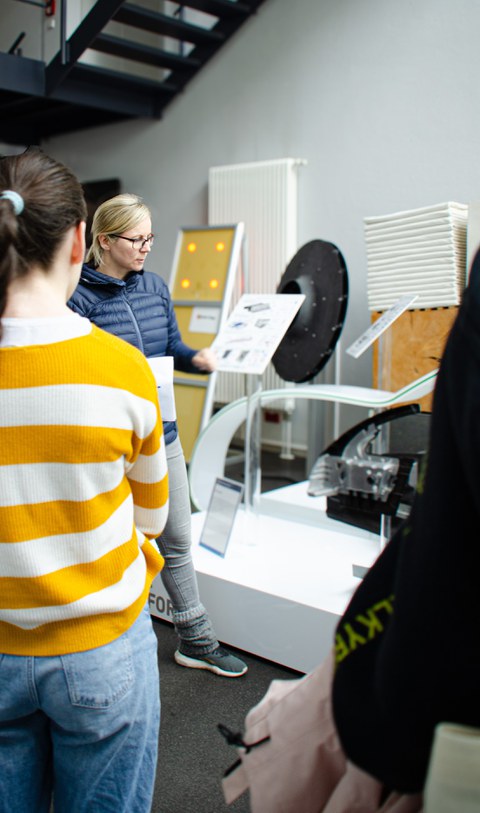
Girls'Day 2024 Impressionen
Laut einer Statistik der Bundesagentur für Arbeit begannen im Jahr 2023 rund 21.000 Frauen eine duale MINT-Ausbildung – ein Anstieg von 10,5 % im Vergleich zu 2017. Die positive Entwicklung verdeutlicht, dass gezielte Maßnahmen zur Förderung von Frauen in technischen Berufen Wirkung zeigen. Eine dieser Maßnahmen ist der Girls‘Day, welcher jungen Frauen eine praxisnahe Berufsorientierung in Bereichen ermöglicht, in denen Frauen noch immer unterrepräsentiert sind.
Auch das Institut für Leichtbau und Kunststofftechnik (ILK) engagierte sich im Jahr 2024 wieder aktiv am bundesweiten Aktionstag und bot zehn Schülerinnen der 7. bis 12. Klasse die Möglichkeit, ihren Girls‘Day am ILK zu verbringen. Das Vermitteln technologischer Grundlagen und das Aufbrechen bestehender Klischees über die männerdominierten „Ingenieur“-Berufe, ist stets Ziel des Girls‘Days. Dr.-Ing. Anja Winkler und Dipl.-Ing. Lisa Dahrmann, beide Ingenieurinnen am ILK, berichteten über ihre eigenen beruflichen Werdegänge und beantworteten zahlreiche Fragen der Teilnehmerinnen.
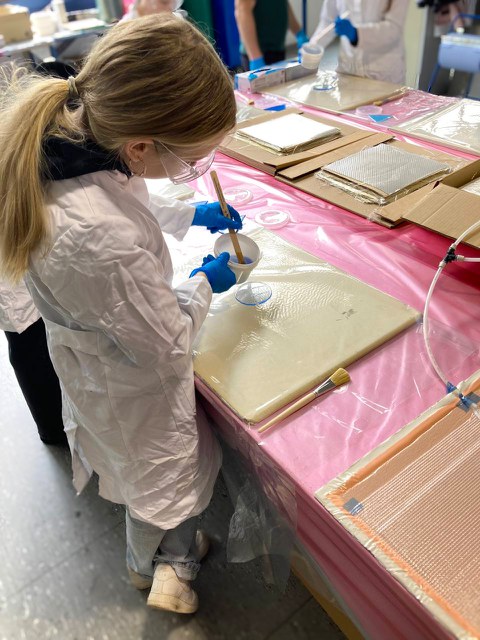
Girls'Day: Handlaminieren am ILK.
Bei einer Führung durch die Technikhallen des ILK auf dem Campus Johannstadt konnten die Schülerinnen verschiedene Produktions- und Prüfverfahren aus nächster Nähe erleben. Im Leichtbau-Innovationszentrum (LIZ), dem Kunststoff-Anwendungszentrum (KAZ) und dem Prozess-Entwicklungszentrum (PEZ) verfolgten sie spannende Live-Experimente. Darüber hinaus konnten sie sich im Handlaminieren ausprobieren – einem Verfahren zur manuellen Herstellung von faserverstärkten Kunststoffen. So erfuhren sie aus erster Hand, wie Bauteile aus Faserverbundwerkstoffen entstehen und welche Bedeutung diese leichten, aber belastbaren Materialien für moderne Anwendungen haben.
Das ILK setzt sich weiterhin aktiv dafür ein, Frauen für technische Berufe zu begeistern und Geschlechterrollen im Ingenieurwesen aufzubrechen. Solche Formate sind essenziell, um langfristig mehr Diversität in der Forschung und Industrie zu erreichen und junge Talente für den Leichtbau zu gewinnen.
Bereits in seiner dritten Ausgabe fand 2024 das von der TU Dresden organisierte Herbstcamp in Altenberg statt. Das fünftägige Camp richtet sich an Mädchen der 9. bis 12. Klasse und bietet ihnen die Möglichkeit, naturwissenschaftliche und technische Disziplinen praxisnah zu erkunden.
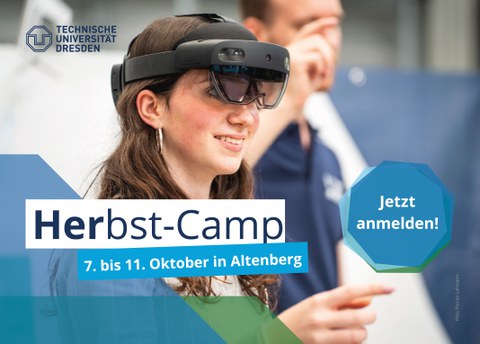
Herbstcamp für Schülerinnen 2024.
Im Rahmen interaktiver Workshops mit Wissenschaftler:innen der TU Dresden konnten die Teilnehmerinnen theoretisches Wissen erwerben und experimentieren, entdecken sowie gestalten. Die jungen Frauen sollen für technische Berufe und Studiengänge zu begeistert werden, indem sie in den direkten Austausch mit Forscher:innen treten und ihre eigenen Erfahrungen sammeln dürfen.
Ein Schwerpunkt des ILK-Workshops lag auf den Eigenschaften, dem Recycling und der Herstellung von Polymeren. Dabei wurden zentrale Fragen der Werkstoffwissenschaft behandelt, darunter folgende:
- Was sind Kunststoffe und wo begegnen sie uns im Alltag?
- Welche Kunststoffarten gibt es und wie lassen sie sich unterscheiden?
- Wie sieht ein nachhaltiges Produktdesign aus?
- Wie werden Kunststoffbauteile hergestellt?
Dabei analysierten die Mädchen verschiedene Bauteile hinsichtlich ihrer Funktionalität und Recyclingfähigkeit. Besonders praxisnah wurde es bei der Sortierung und Analyse von Kunststoffen anhand von Recyclingcodes. Die Schülerinnen lernten, welche Herausforderungen mit der Trennung und Wiederverwertung unterschiedlicher Polymere verbunden sind und wie nachhaltige Produktkreisläufe gestaltet werden können. Der direkte Austausch mit Wissenschaftler:innen vertiefte ihr Verständnis für die Rolle des Leichtbaus in der Kreislaufwirtschaft und zeigte ihnen mögliche Karrierewege in den Ingenieurwissenschaften auf.
Das Institut für Leichtbau und Kunststofftechnik (ILK) hatte 2024 die Ehre, Frau A. Bobes, eine junge Wissenschaftlerin und ein vielversprechendes Talent im Ingenieurwesen, zu empfangen. Sie ist die Gewinnerin des renommierten Wettbewerbs Jugend forscht im Bereich Physik und Finalistin der International Science and Engineering Fair 2024 (ISEF). Die Jungwissenschaftlerin entschied sich nicht nur für ein Maschinenbaustudium an der TU Dresden, sondern brachte auch eine bahnbrechende Erfindung mit ans ILK: einen Helix-Rotor zur umweltfreundlichen, dezentralen Stromerzeugung für Straßenlaternen.
Die Turbine, die die junge Forscherin in ihrer Schulzeit über einen Zeitraum von vier Jahren entwickelte, ist speziell für die Nutzung von Windenergie in städtischen Gebieten konzipiert. Die Helix-Rotoren können auf Straßenlaternen montiert werden und sollen diese unabhängig vom Stromnetz mit nachhaltiger Energie versorgen. Die Technologie bietet eine effiziente Alternative zu Solarzellen, die in vielen Fällen nicht ausreichen, um eine konstante Beleuchtung zu gewährleisten. Die geplante Feldtestphase sieht vor, dass die Helix-Rotoren über einen Zeitraum von zwölf Monaten unter realen Bedingungen an Laternenmasten montiert werden. Dabei wird untersucht, ob sie zuverlässig genug sind, um den Strombedarf der Straßenlaternen unter verschiedenen Wetterbedingungen zu decken.
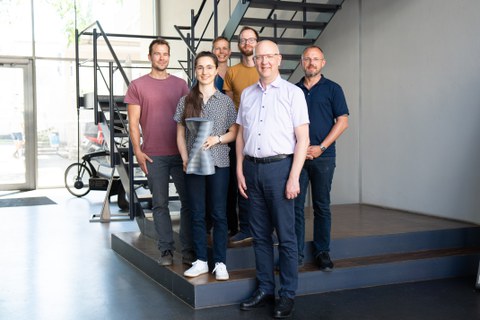
Gruppenfoto (v.l.n.r.) Richard Grothe, Anne Marie Bobes, Dr. Juliane Troschitz, Dr. Michael Müller-Pabel, Prof. Dr. Niels Modler, Michael Müller.
Um sicherzustellen, dass die Turbinen den Bedingungen im städtischen Umfeld standhalten, besuchte die junge Erfinderin das ILK. Vor Ort begrüßten sie Vorstandsmitglied Prof. Dr.-Ing. Niels Modler und die ILK-Wissenschaftler:innen Dr.-Ing. Michael Müller-Pabel, Dr.-Ing. Juliane Troschitz sowie Dipl.-Ing. Richard Grothe. Gemeinsam besprachen sie geeignete Fertigungstechnologien und Werkstoffe, um die Robustheit und Effizienz der Rotoren weiter zu optimieren. Zudem werden am ILK künftig in Zusammenarbeit mit Frau Bobes umfangreiche Simulationen durchgeführt, um die Auslegung der Turbine genau zu bewerten und mögliche Verbesserungen zu identifizieren.
Neben den technischen Diskussionen nutzte die junge Forscherin gemeinsam mit ihrem Lehrer Herr Michael Müller die Gelegenheit, die Stadt Dresden und das ILK näher kennenzulernen. Beide waren von der modernen Ausstattung und der offenen Atmosphäre begeistert.
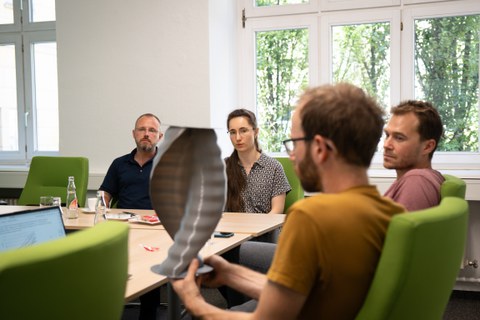
Die junge Wissenschaftlerin Anne Marie Bobes im Gespräch am ILK.
Die Zusammenarbeit zwischen der jungen Wissenschaftlerin und dem ILK markiert den Beginn einer vielversprechenden Entwicklung im Bereich der nachhaltigen Energieerzeugung. Darüber hinaus ist das ILK stolz darauf, junge Talente fördern zu dürfen und ihnen die notwendigen Ressourcen zur Verfügung zu stellen, um ihre zukunftsweisenden Ideen zu verwirklichen. Mit der Aufnahme des Maschinenbau-Studiums an der TU Dresden legt die junge Forscherin den Grundstein für ihre zukünftige Karriere. Das ILK wird Frau Bobes auf ihrem Weg nicht nur mit fachlichem Know-how, sondern auch mit tatkräftiger Unterstützung zur Seite stehen. Die Kooperation zwischen der Jungwissenschaftlerin und dem ILK zeigt beispielhaft, wie Nachwuchstalente wissenschaftliche Innovationen in die Praxis überführen können – und dabei in Einrichtungen wie dem ILK engagierte Unterstützung und ideale Entwicklungsbedingungen finden. Mit großer Begeisterung verfolgen wir die nächsten Schritte und freuen uns darauf, Frau Bobes weiterhin auf ihrem Weg zu begleiten.
Der gemeinnützige Verein juniorIng. Sachsen e. V. wurde 2009 von Mitarbeiter:innen des ILK der TU Dresden gegründet, um das Interesse junger Menschen frühzeitig an Ingenieur- und Naturwissenschaften zu wecken und nachhaltig zu fördern. Durch die Arbeit möchten die Vereinsmitglieder technologische Bildung praxisnah vermitteln und Schüler:innen aller Altersstufen für den Leichtbau begeistern.
In enger Zusammenarbeit mit wissenschaftlichen und kulturellen Bildungsträgern in Dresden und ganz Sachsen organisiert juniorIng praxisorientierte Veranstaltungen für Kindertagesstätten, Schulen, Berufsschulen und Gymnasien. Die Themen reichen von den Grundlagen der relevanten Werkstoffe und Bauweisen über konstruktive Aspekte bis hin zu Nachhaltigkeitsstrategien im Leichtbau.
Darüber hinaus unterstützt der Verein Lehrkräfte und pädagogisches Personal bei der anschaulichen und praxisnahen Vermittlung ingenieurwissenschaftlicher Inhalte – sei es durch Projekttage, schulische Arbeiten oder den Verleih von Experimentiermaterial wie Werkstoff-, Bauweisen- oder Verarbeitungskoffern. In Kooperation mit dem ILK führt juniorIng zudem Experimente mit den jeweiligen Zielgruppen durch und ermöglichen so ein greifbares Verständnis für ingenieurwissenschaftliche Zusammenhänge.
Im Jahr 2024 konnten zahlreiche Angebote umgesetzt werden, die Jugendlichen praxisnahe Einblicke in die Welt der Leichtbauingenieur:innen ermöglichten. Dazu zählten unter anderem Schulprojekttage, die Teilnahme an Formaten wie Schau Rein! oder dem Girls’ Day sowie die Unterstützung der Schüler:innen des Martin-Andersen-Nexö-Gymnasiums bei ihren wissenschaftlichen Arbeiten (KOLL und BELL).
Darüber hinaus begeisterte das Probestudium tryING angehende Studentinnen für die Fertigung und Prüfung von Faserverbundwerkstoffen. Seit 2021 ist der Verein zudem im Vorstand des Landesverbandes Sächsischer Jugendbildungswerke e. V. (LJBW) aktiv und engagiert sich für die landesweite Koordination von MINT-Aktivitäten und Schulsozialarbeit.
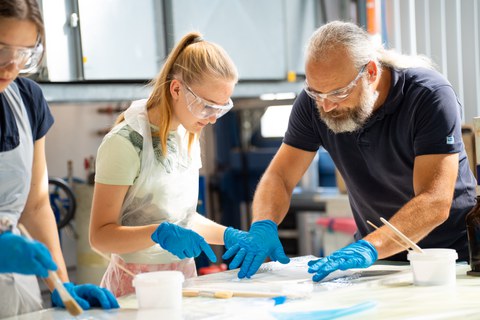
TryING 2024.
Mit den Aktivitäten wurden bereits zahlreiche Kinder und Jugendliche erreicht. Dabei wurde nicht nur Wissen vermittelt, sondern auch gemeinsame, inspirierende und lehrreiche Erfahrungen gesammelt.
Sie möchten über unsere Aktivitäten für junge Menschen auf dem Laufenden bleiben? Besuchen Sie unseren Instagram-Kanal @ilk.dresden
Kontakt
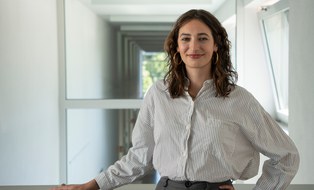 © Florian Lehmann
© Florian Lehmann
Saskia Trute B.A.
Kommunikation/PR
Eine verschlüsselte E-Mail über das SecureMail-Portal versenden (nur für TUD-externe Personen).
Institut für Leichtbau und Kunststofftechnik
Besucheradresse:
DÜR, Institut für Leichtbau und Kunststofftechnik Holbeinstr. 3
01307 Dresden
Deutschland
Besuchsadresse:
DÜR, Etage 2, Raum 259 Holbeinstr. 3
01307 Dresden
Deutschland


